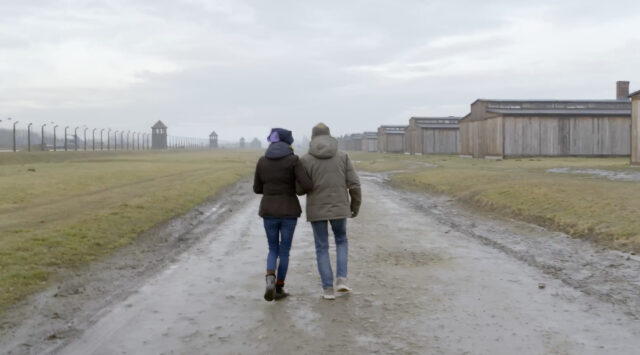
Holocaust survivor Marcel Zielinski revisits Auschwitz with his granddaughter, Chen, in For the Living
FOR THE LIVING (Marc Bennett & Tim Roper, 2024)
Marlene Meyerson JCC Manhattan
334 Amsterdam Ave. at West Seventy-Sixth St.
Thursday, April 24, $19.95, 7:00
www.jccmanhattan.org
www.forthelivingmovie.com
“When considering the question, What makes us human?, we must also ask, What might render us less than human? And more importantly, What makes us inhumane?” narrator Tim Roper says at the beginning of For the Living, a powerful and important documentary he codirected with Marc Bennett.
Near the end of the film, Yale professor and On Tyranny author Timothy Snyder points out, “Recognizing that someone else is a human being is a really demandingly high threshold. If you can get to that, then a lot of other problems will solve themselves.”
In the documentary, which is having a special screening April 24 at the Marlene Meyerson JCC Manhattan on the Upper West Side, Roper and Bennett use the 2019 Ride for the Living as the centerpiece of their exploration of dehumanization and genocide and the need for empathy and compassion.
In 2014, software developer and long-range cyclist Robert Desmond traced the liberation path, a twenty-five-day, 1,350-mile bike ride from London to Auschwitz, stopping off at historic locations related to WWII and, more specifically, the Holocaust. The next year, Desmond, a British Jew, established the Ride for the Living, in which groups of bikers travel from Auschwitz to Krakow, following the rode that ten-year-old Marcel Zielinski and many others walked after being freed from the concentration camp in 1945. Zielinski became a regular rider at the annual event, establishing a close relationship with Desmond; despite their age gap of more than fifty years, they consider themselves brothers.
The film cuts between the preparation for the 2019 Ride for the Living, archival Holocaust footage, and brief explorations of twentieth-century genocides in Turkey, Cambodia, Bosnia, and Rwanda as well as the treatment of Indigenous peoples in what would become America and African slavery.
Zielinski returns to his childhood home and visits Auschwitz with his granddaughter, Chen, sharing terrifying details of what he experienced. Bernard Offen, who survived five camps as a child and lost fifty-nine members of his family in the Holocaust, emphasizes how important it is to tell the story, a critical theme through the film.
Rabbi Michael Paley notes, “We shouldn’t come as tourists just to see [Auschwitz]; we should come as witnesses, we should bear witness.” Nuremberg prosecutor Ben Ferencz demands, “Crimes against humanity should not be tolerated.”
Krakow Jewish Community Center CEO and ride participant Jonathan Ornstein explains, “The most important message is not being a bystander, they say. There will always be good people, and there will always be bad people, and I think the way the world goes is largely dependent on the ones in the middle.”
Roper and Bennett also speak with Zimbabwe genocide survivor and international human rights lawyer Gugulethu Moyo, United States Holocaust Memorial Museum founding project director Rabbi Michael Berenbaum, USC Shoah Foundation executive director emeritus Stephen Smith, Emory psychology professor emeritus Frans de Waal, University of Illinois at Chicago social emotional learning chair Kimberly Schonert-Reichl, and Anti-Defamation League CEO Jonathan Greenblatt.
In the latter part of the 117-minute film, the focus turns to dehumanization and antisemitism, as practiced by the Nazis and even world leaders today, referencing how Hitler was influenced by America’s belief in manifest destiny, a concept that is now being practiced by Vladimir Putin in Russia and the current US administration.
“I grew up thinking that we learned the lessons of the Holocaust, and I’ll say living here, in the heart of Europe for eighteen years, that I don’t think those lessons were learned,” Ornstein says. “With antisemitism on the rise, with Holocaust denial on the rise, I’m shocked by things that happen all around Europe; I’m shocked by things that happen in the United States.”
University of New England philosophy professor David Livingstone Smith explains, “There are great advantages to be reaped by doing bad things to others, by exterminating them,” adding that in certain “circumstances, with the psychology we have, very many of us would yield to that way of thinking.”
And astrophysicist Neil deGrasse Tyson posits, “It’s pretty clear when you look at the history of atrocities, it’s not just simply hatred; it’s like a psychological delusion that has to be put into place so that you can carry this out on a large scale.”
The film — which opens with Talking Heads’ “Road to Nowhere” and concludes with Joan Osborne’s version of Bruce Springsteen’s more hopeful “Further On Up the Road” — was made prior to the current administration, but it’s hard not to think about what is happening right now in the United States involving illegal immigrants, deportation, and antisemitism. Words such as dehumanization and empathy are again being discussed every day.
“It’s bigger than a Jewish thing; this is a human tragedy,” Desmond says.
And it’s far from over.
Roper, Bennett, and producer Lisa Effress will participate in a Q&A following the 7:00 screening at the JCC. The film is also being shown April 23 at 6:30 at Iona University in New Rochelle before traveling to festivals in Dubuque, Boulder, Flint, Detroit, and the Berkshires. The next Ride for the Living is scheduled for June 25–29; registration is now open.
[Mark Rifkin is a Brooklyn-born, Manhattan-based writer and editor; you can follow him on Substack here.]